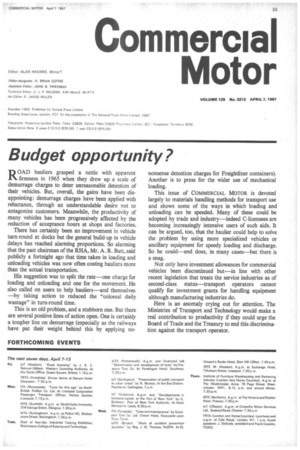Budget opportunity?
Page 35

If you've noticed an error in this article please click here to report it so we can fix it.
OAD hauliers grasped a nettle with apparent IX firmness in 1965 when they drew up a scale of demurrage charges to deter unreasonable detention of their vehicles. But, overall, the gains have been disappointing: demurrage charges have been applied with reluctance, through an understandable desire not to antagonize customers. Meanwhile, the productivity of many vehicles has been progressively affected by the reduction of acceptance hours at shops and factories.
There has certainly been an improvement in vehicle turn-round at docks but the general build-up in vehicle delays has reached alarming proportions. So alarming that the past chairman of the RHA, Mr. A. R. Butt, said publicly a fortnight ago that time taken in loading and unloading vehicles was now often costing hauliers more than the actual transportation.
His suggestion was to split the rate—one charge for loading and unloading and one for the movement. He also called on users to help hauliers—and themselves —by taking action to reduced the "colossal daily wastage" in turn-round time.
This is an old problem, and a stubborn one. But there are several positive lines of action open. One is certainly a tougher line on demurrage (especially as the railways have put their weight behind this by applying no nonsense detention charges for Freightliner containers). Another is to press for the wider use of mechanical loading.
This issue of COMMERCIAL MOTOR is devoted largely to materials handling methods for transport use and shows some of the ways in which loading and unloading can be speeded. Many of these could be adopted by trade and industry—indeed C-licensees are becoming increasingly intensive users of such aids. It can be argued, too, that the haulier could help to solve the problem by using more specialized vehicles or ancillary equipment for speedy loading and discharge. So he could—and does, in many cases—but there is a snag.
Not only have investment allowances for commercial vehicles been discontinued but—in line with other recent legislation that treats the service industries as of second-class status—transport operators cannot qualify for investment grants for handling equipment although manufacturing industries do.
Here is an anomaly crying out for attention. The Ministries of Transport and Technology would make a real contribution to productivity if they could urge the Board of Trade and the Treasury to end this discrimination against the transport operator.
































































































































































